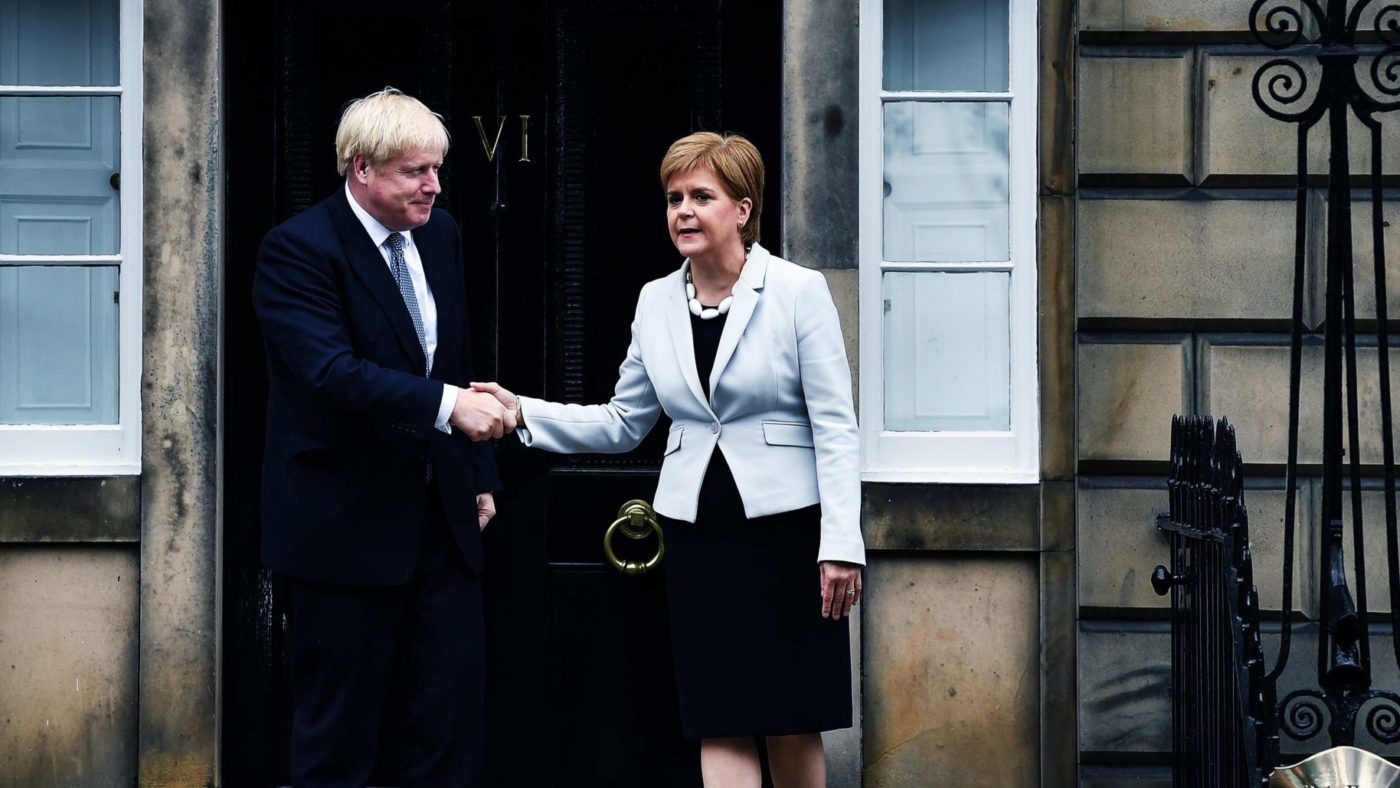It’s rare for something to be both comical and deeply tedious, but how else to describe the Scottish National Party’s contortions as it tries to justify voting against the Brexit deal after spending years alleging that a no-deal outcome was the worst possible?
Whilst we must be careful not to over-egg the speed at which the shine is coming off Nicola Sturgeon’s machine, it does nonetheless feel as if this manoeuvre would have been executed much more artfully – if no less cynically – even a couple of years ago. As it is, the line about casting ‘a principled vote against Brexit’ seems awfully thin.
It would seem strange also, from the perspective of 2016, that they will share the ‘No’ lobby with all the sitting Northern Irish MPs. The Democratic Unionists, who both campaigned for Brexit and provided vital support to keep the Conservatives in office after 2017, will join the Alliance and SDLP in voting against a proposal they argue deeply injures Ulster’s position in the United Kingdom.
All this points to at least one way in which Brexit is going to continue to shape the politics of this Parliament, even though Boris Johnson has just allegedly ‘got it done’: the shadow it will cast on the battle for the Union.
It is easy, in the immediate afterglow of the negotiations, to conclude that the Prime Minister will be remembered for Europe. But he himself likely has too strong a sense of history to make this mistake. The loss of Scotland and the probable extinction of the British state would certainly eclipse the rest of his legacy. Northern Ireland’s semi-detached status means its loss would likely cast a smaller shadow, but with his culpability for the Protocol Johnson would still be courting inclusion on a short and ignoble list, currently comprising Anthony Eden and Lord North, of British leaders whose names serve as shorthand for national humiliations.
With the negotiations concluded and Scottish elections looming next year, there is a sense in government that the focus can now shift from the one problem to the next. But politics is never quite so tidy.
In Ulster’s case, the source of friction is obvious. When Johnson said in 2018 that no Prime Minister could accept an Irish Sea border as it would “leave Northern Ireland behind… damaging the fabric of the Union”, his description of the impact of such an arrangement was quite accurate. As it stands, it looks as if trade friction between the mainland and Northern Ireland is already going to be high, and that burden will only worsen as the EU continues to develop its Single Market regulations.
Michael Gove wants credit for striking an arrangement with Brussels that mitigates many of the worst effects, but when defending it in the Commons he slithered around the important questions. Allegations from the DUP that the ‘grace period’ for food products was intended only to give local businesses time to shift their supply chains to the Republic of Ireland, rather than negotiate terms which would protect British ‘imports’, were met with empty bromides.
All this has the potential to destabilise Northern Irish politics for years to come, although perhaps in a new era of majority government that won’t register in Great Britain the way it ought to. But if the Irish Sea border infrastructure starts getting attacked – and the republicans have no monopoly on illegal force – the buck will stop with Johnson.
Scotland is more complicated. It always has been, despite the determination with which Remain campaigners have repeated their dire warnings about Brexit bringing about the end of the UK. Britain leaving the EU might strengthen the emotional appeal of ‘Scexit’, but it raises considerable practical difficulties by forcing an independent Scotland to choose between the British market and the European.
Along with the fact that over a million Scots voted Leave, including a substantial minority who support independence, this explains both why SNP MPs told journalists that preventing Brexit was crucial to salvaging their project and why Sturgeon spent much of 2017 and 2018 becalmed, having set her sails out for a wind of popular outrage which never came. (Those desperate for an I-told-you-so are pointing to her current situation, but that owes much more to the Government’s chronic mishandling of Covid-19 and the glowing coverage afforded the SNP’s own response. All the best generals are lucky.)
Viewed in this light, a deal with Europe cuts both ways. On the one hand, it is less likely to alienate the crucial ‘No/Remain’ constituency which has been flirting with independence, and thus offers a boost to the long-neglected emotional case for the Union, and might give ministers an opportunity to offer high-profile support to fishing and other emotionally salient industries. Gove certainly suggested as much in a recent article.
But on the other, any deal which ameliorates a ‘hard border’ with Europe necessarily softens a hypothetical border between the UK and an independent-in-Europe Scotland. The current arrangement has been described as ‘thin’, but there is no certainty it won’t fill out as our relationship with the EU develops. Nor should Westminster forget the cultural bonds between western Scotland and Northern Ireland, which might make the prospect of dismantling Johnson’s new Irish Sea border a tempting one, even if it means erecting one at Gretna.
Johnson will always be the Prime Minister who finally took Britain out of the EU. But the manner in which he has done so could yet see him remembered for something else entirely. If he wishes to go down in history as the triumphant Brexiteer, he must make the defence of the Union his top priority.
Click here to subscribe to our daily briefing – the best pieces from CapX and across the web.
CapX depends on the generosity of its readers. If you value what we do, please consider making a donation.


